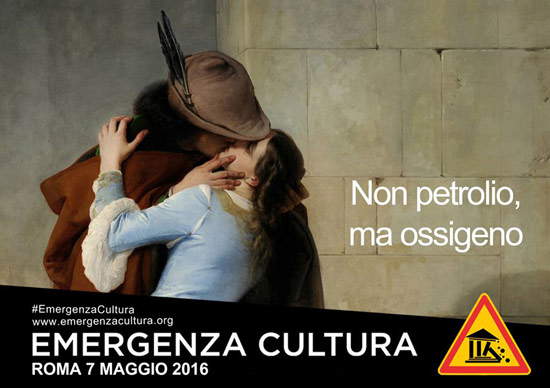Two days to defend culture: this is the goal of Emergenza Cultura, the demonstration “in defense of Article 9” of the Constitution that will be held in Rome on Saturday, May 7, and will be preceded, on Friday, May 6, by a conference. The organizing committee, assembled at the suggestion of art historian Tomaso Montanari, kicked off this initiative as a result of “concern about the conditions in which culture is left in our country.” We read further, in the mission statement, “from museums to libraries, archives, archaeological sites, restoration institutes, and the teaching of art history, everything that is not immediately traceable to a source of profit is in a state of neglect, as if the only dimension worthy of interest to the community is the biecally economic one.” Emergency Culture was therefore called to oppose this drift.

Associations, committees for the defense of the territory, movements, as well as important cultural personalities have already joined the event. It is an event that does not only aim at criticism of the government: in fact, the promoting committee has published a manifesto with very specific demands. Thus, it calls for the abandonment of so-called “major works” in order to invest rather in securing the territory, it calls for the suspension of the amalgamation of superintendencies and the withdrawal of the rule of silence-consent, that the protection of heritage be entrusted to the technicians recognized by Law 110 of 2014, that the 1.400 hires needed to complete the Ministry’s staffing, that the rights and protections for professionals working in the sector on a self-employed basis be recognized, that an investment plan be adopted in the research and education sectors, that art history teaching hours in schools be restored, and more.
The demonstration on Saturday 7 will start at 12 noon from Piazza della Repubblica and arrive at 1 p.m. in Piazza Barberini, where the closing rally will be held. The conference on Friday 6 will be held starting at 3 p.m. at the iCavour Conference Center on Via Cavour (near Piazza della Repubblica). Our own Federico Giannini will also give a speech at the conference: the title will be “Heritage, the network, the general public.” And on Saturday in the square we from Finestre Sull’Arte will also be there. So much has already been said about Emergenza Cultura: we, quite simply, will participate because we believe that culture has lost the central role it should have in our country, and occasions such as these are important to make the voices of those who, on the contrary, believe that a country with a future-oriented vision must necessarily give fundamental weight to culture. Below is the program for the May 6 conference:
Greeting: Tomaso Montanari
Introduction: Salvatore Settis
First session: Protection
1. The crock pot: a Code at the mercy of the regulatory storm (Maria Pia Guermandi)
2. The “holistic” organization and the protection-valorisation disarticulation (Manlio Lilli)
3. The landscape (Vezio De Lucia)
4. Fate of archaeology (Angela Pontrandolfo)
5. The export (Maria Vittoria Marini Clarelli)
6. Autonomous museums (Andrea Camilli)
7. Parks (Sauro Turroni)
8. The transformation of historic centers and citizen participation (Gaia Pallottino)
Second session: Work
1. Work in cultural heritage today (Salvatore Chiaramonte)
2. Mibact: the rights of workers (Giuliana Guidoni)
3. The rights of those who would like to work: precarious, volunteers, slaves (Guido Cioni)
4. The forced extinction of technical officials (Rita Paris)
5. Experiences of (de)training (500 young people for culture)
Third session: Funding and operations
1. The real numbers of the Mibact (Vittorio Emiliani)
2. Libraries (AssolettoriBNCF)
3. Archives (Ferruccio Ferruzzi)
Fourth session: training, research, fruition
1. Knowledge workshops (Piero Bevilacqua)
2. The right to study (Alberto Campailla)
3. The right to research (Paolo Liverani)
4. Art history and good schooling (Lucinia Speciale, Roberto Scognamillo)
5. The heritage school and the training of officials (Fulvio Cervini)
6. Heritage, the network, and the general public (Federico Giannini)
Fifth session: testimonies of associations and committees
The author of this article: Federico Giannini e Ilaria Baratta
Gli articoli firmati Finestre sull'Arte sono scritti a quattro mani da Federico Giannini e Ilaria Baratta. Insieme abbiamo fondato Finestre sull'Arte nel 2009. Clicca qui per scoprire chi siamoWarning: the translation into English of the original Italian article was created using automatic tools. We undertake to review all articles, but we do not guarantee the total absence of inaccuracies in the translation due to the program. You can find the original by clicking on the ITA button. If you find any mistake,please contact us.